English Words in Action, Group C
(a variety of English words which have developed through history and are currently used in our modern age)
Simply click on this banner (or the following link) and you will be on your way to stimulate your brain for greater word comprehension with quizzes based on some of the words in this unit.
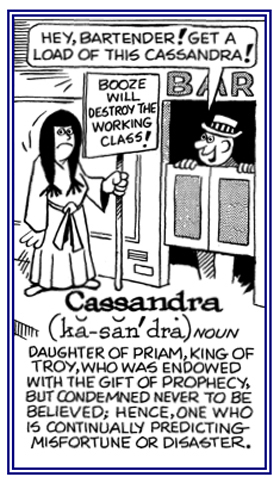
Go to this Word A Day Revisited Index
so you can see more of Mickey Bach's cartoons.
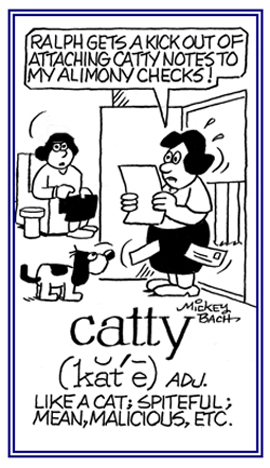
Go to this Word A Day Revisited Index
so you can see more of Mickey Bach's cartoons.
Caucuses are planned in several states to nominate candidates for President of the United States.
2. Meetings of people; such as, members of the U.S. Congress, who meet to determine issues or to work together for certain objectives: The Congressional Education Caucus got together to see what can be done to improve the school systems in several areas of the country.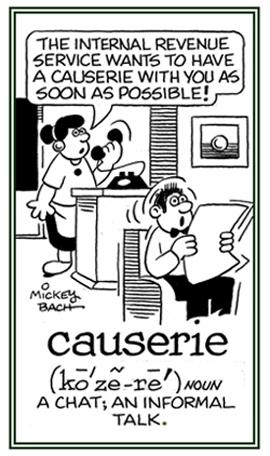
Go to this Word A Day Revisited Index
so you can see more of Mickey Bach's cartoons.
2. A formal notice filed with a court or law officer to suspend a prosecution until after the person who is filing is given a hearing: Susan’s lawyer submitted a caveat asking for a break in the trial giving her a chance to testify and to give evidence as to what really happened before the legal proceedings continue.
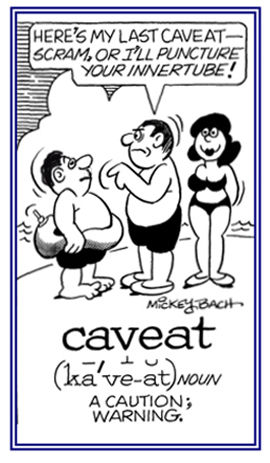
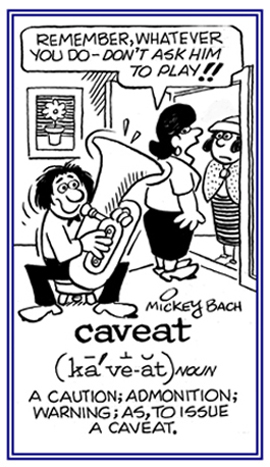
Go to this Word A Day Revisited Index
so you can see more of Mickey Bach's cartoons.
The principle rule that a buyer cannot assume that his or her purchase will be exactly as hoped for or promised.
The full version is: Caveat emptor, quia ignorare non debuit quod jus alienum emit. "Let a purchaser beware, for he ought not to be ignorant of the nature of the property which he is buying from another party."
The well-known shorter version, Caveat Emptor applies to the purchase of land and goods, with certain restrictions, both as to the title and quality of the thing sold. Out of the legal sphere and as a non-legalistic usage, the phrase is used as a warning to a buyer regarding any articles of doubtful quality offered for sale.
This legal terminology means, the purchaser or buyer, not the seller, is responsible for protecting the himself or herself in the transaction.
Caveat emptor is the opposite of "caveat venditor" in that, according to Eugene Ehrlich: Whereas caveat emptor has a long history in common law, "caveat venditor" is just now coming into prominence as a result of the consumer-rights movement.
Under "caveat venditor", the seller is assumed to be more sophisticated than the purchaser and so he or she must bear responsibility for protecting the unwary purchaser.
The purchaser, emptor, is a child who must be protected against his or her own mistakes, while the seller, "venditor", is the big, bad wolf lying in wait for Little Red Riding Hood. So while the two rules struggle for preeminence, attorneys gleefully watch—and litigate.
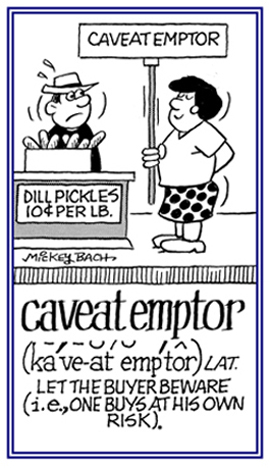
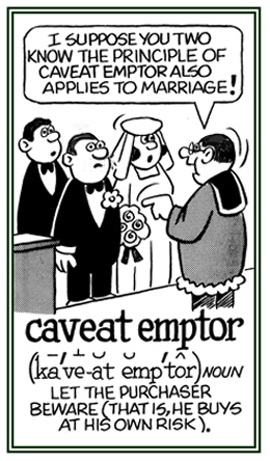
Go to this Word A Day Revisited Index
so you can see more of Mickey Bach's cartoons.
2. To leap or to jump playfully; to romp, to frolic: Monte watched the ponies cavorting in the corral.
3. To spend time in an enjoyable and often wild or improper way: The politician was criticized for cavorting with the rich and ignoring the other citizens of his district.
When Mark and Jane were unable to get a room at the hotel while they were on vacation, it was a frustrating chagrin for them.
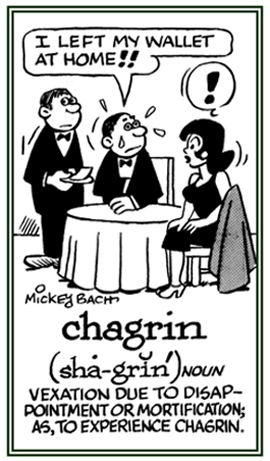
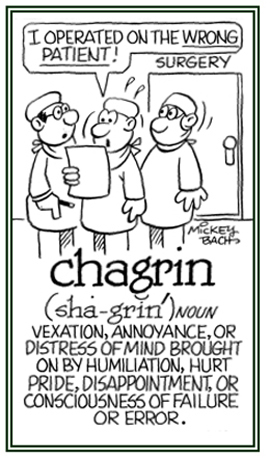
Go to this Word A Day Revisited Index
so you can see more of Mickey Bach's cartoons.
2. A kind of long vehicle with transverse seats (crossing from side to side) generally facing forward: People lined up to get on the charabanc to go sightseeing.
3. Etymology: from French for a "wagon with seats" or a vehicle carrying many passengers and which is used for public transportation.
Helena's chariest attitude is not to spend any more money for her university degree.
2. Etymology: from Old English cearig, "sorrowful"; and then from Middle English chari, "careful, sorrowful".Interestingly enough, the term chauvinism was first used by a Napoleonic soldier, Nicholas Chauvin, who turned out to be an extreme patriot during that time.
2. Unwarranted bias, favoritism, or devotion to one's own particular group, cause, or idea: Feminists say that male chauvinism is still prevalent in many cultures around the world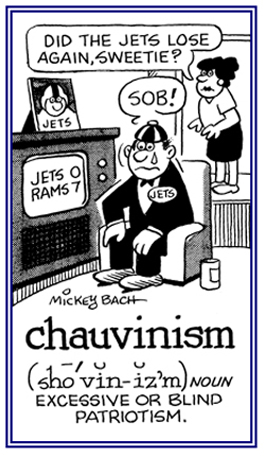
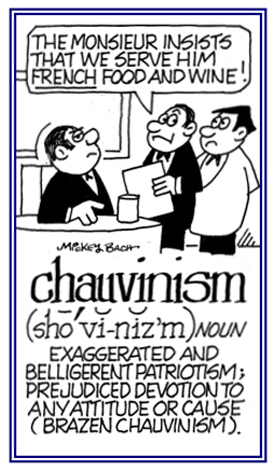

Go to this Word A Day Revisited Index
so you can see more of Mickey Bach's cartoons.
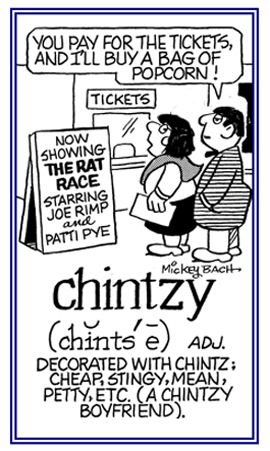
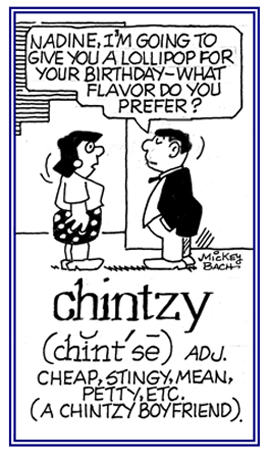
Go to this Word A Day Revisited Index
so you can see more of Mickey Bach's cartoons.
The movie business is booming in China, and I wanted an inside look. Last year’s box-office earnings topped $1.5 billion, a 64 percent increase from 2009, making China’s movie market on target to be the world’s second-largest by 2015. Sometimes dubbed Chollywood, China's movie industry pumped out 526 films in 2010 (versus 754 in the U.S.), and the government has announced plans to more than double the size of the entertainment industries, including movies and television, over the next five years.
Hollywood has noticed. Chinese-U.S. co-productions are on the rise, and Christian Bale, Kevin Spacey, and Keanu Reeves are among the stars who have sought projects here.
So eager are American studios to crack the Chinese market that MGM recently edited Chinese villains out of the remake of Red Dawn, replacing them with North Koreans. Studios can’t afford to offend the officials who decide which 20-odd foreign films are allowed to play each year on Chinese screens, whose number grows by four a day.
Links to all of the groups of English words in action, Groups A to Z.
You may see the bibliographic list of sources of information for these words in action.


